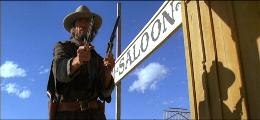Clint Eastwood directs one of his all-time best films in this Western metaphor for the feelings Americans felt after the Vietnam War and Watergate scandal.
Josey Wales (Eastwood) is a Missouri farmer, whose family is brutally murdered by Union troupes during the Civil War. Wales joins a band of irregular rebels fighting against the Union and when the war is over refuses to take an oath of loyalty to the government. His feelings of resentment are well founded in that the oath is really a trap.
With injured young rebel Jamie (Sam Bottoms, THE LAST PICTURE SHOW) in tow, Josey goes on the run from bounty hunters and Union soldiers who want to hunt him down. Hot on his trail are Fletcher (John Vernon, ANIMAL HOUSE), a former rebel who sold out his fellow rebels, and Terrill (Bill McKinney, THE GREEN MILE), the murderous Union soldier who killed Josey’s family. Along the way, Josey picks up a group of tagalongs, which includes wise old Indian Lone Watie (Chief Dan George, HARRY AND TONTO), fiery Indian squaw Little Moonlight (Geraldine Keams), straight-talkin’, no-nonsense Kansas farmer Grandma Sarah (Paula Trueman, MOONSTRUCK) and Sarah’s slow, but beautiful granddaughter Laura Lee (Sondra Locke, EVERY WHICH WAY BUT LOOSE) among others.
Lies about Josey begin to spread like wildfire, taking on legendary proportions. In certain situations, it aids him and in others it hinders him. Key to the film’s success is the development of the central characters. Josey is a quiet loner with a dry, dark sense of irreverent humor. However, foremost, he is haunted by scars that have cut him so deep that they will not heal. And not until close to the end when he goes head to head with the Comanche chief Ten Bears (Will Sampson, ONE FLEW OVER THE CUCKOO’S NEST), do we get the full scope of his sorrow.
Eastwood’s use of timing and cinematography balances right between iconic cool and emotional power. The way he films the outlaws closing in on Laura Lee in the wagon really nails the dread of the situation perfectly. He does things like this throughout the film.
It’s this sure-handedness with the material that lets us forgive some of the redundancies. There are parts of the film that could be cut, but they don’t hurt the flow or weaken the narrative so why bother.
Eastwood also uses the genre as a metaphor, which has been done successfully many times. The sense of betrayal Americans felt in the 1970s is really captured poetically and emotionally. The theme of trying to set aside violence, which has a pull on us all, is one that Eastwood would revisit in his equally powerful UNFORGIVEN. This is one of the best Westerns ever made. Fun, smart and emotionally powerful — it’s everything that cinema should be.








